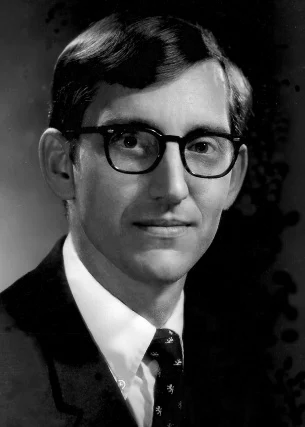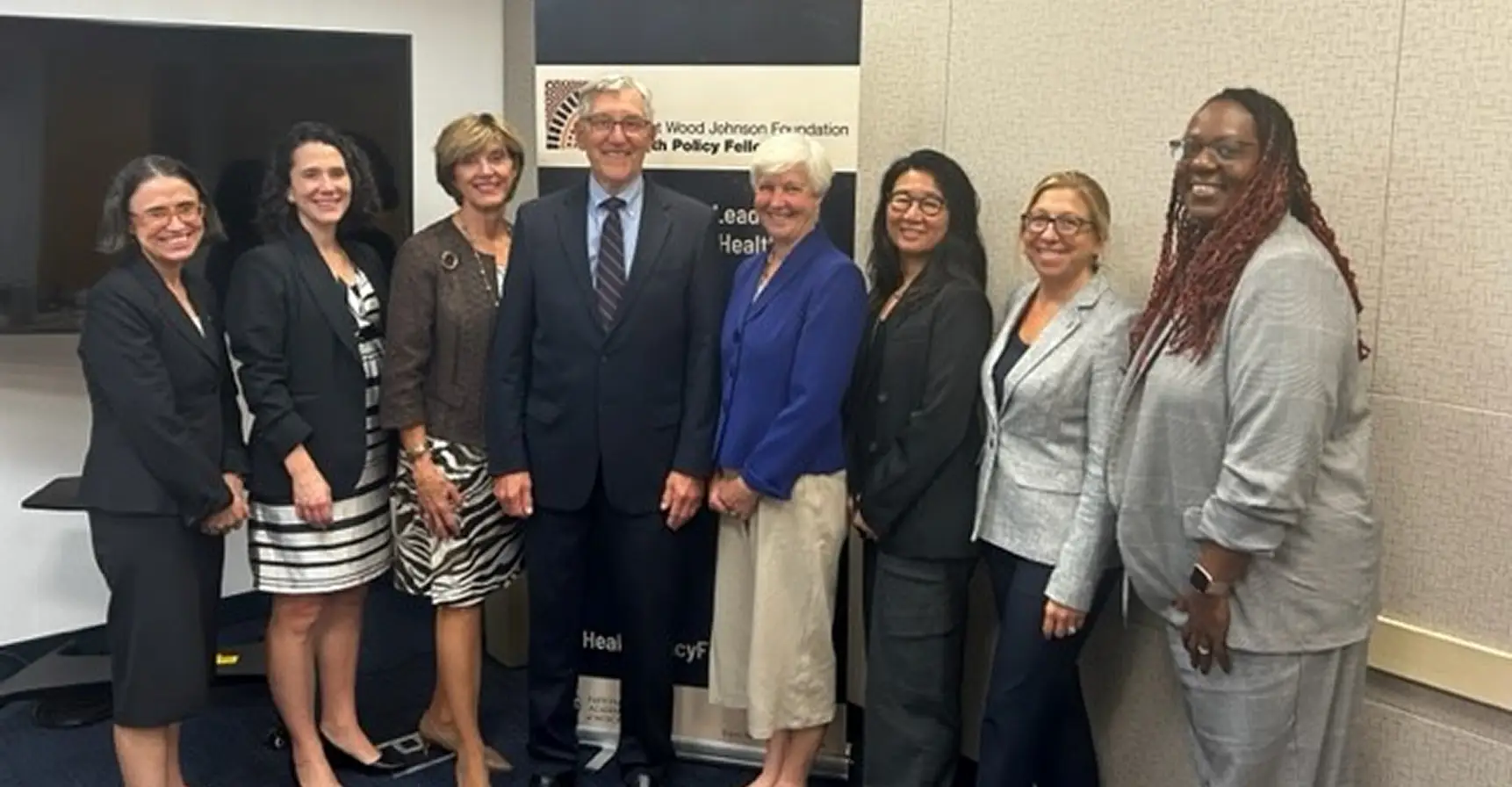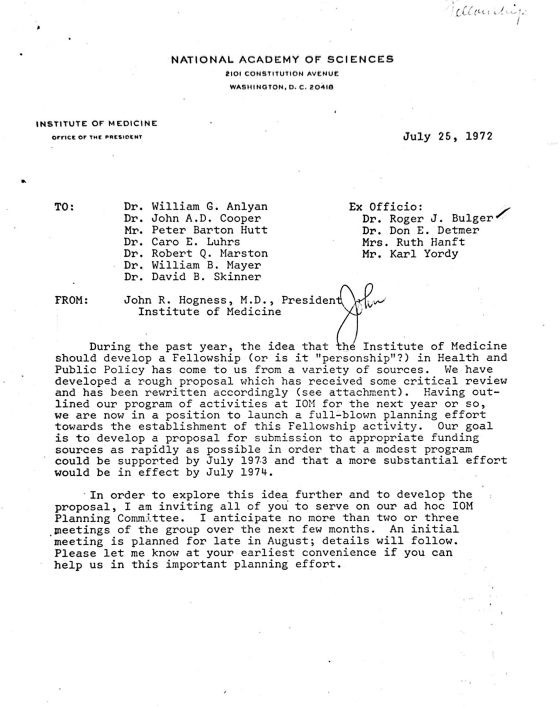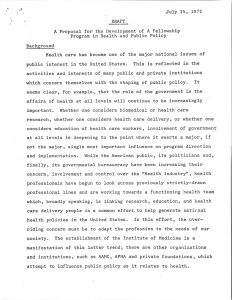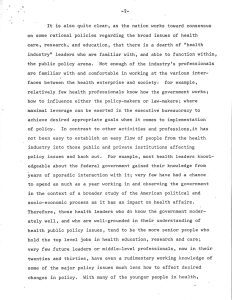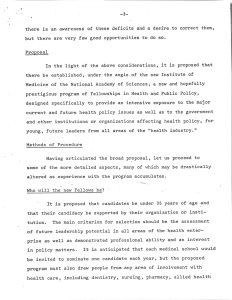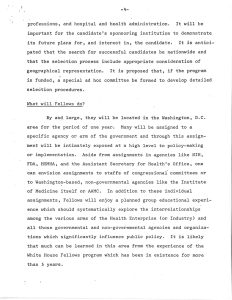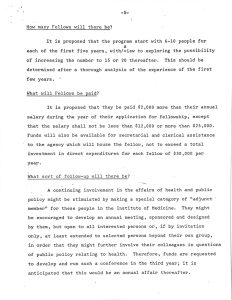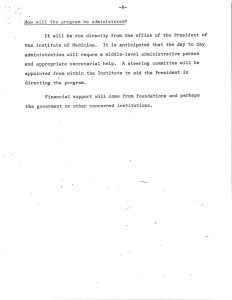EARLY HISTORY
Establishing an IOM Fellowship in Health Policy
EARLY HISTORY
Early History
An IOM Fellowship in Health Policy
Don Detmer, 1972. NASEM Archives
In January 1972, Dr. Don Detmer reached out to IOM president Dr. John Hogness to express his interest in spending a year at the Institute of Medicine. At this point, the IOM was still a fledgling organization. It had officially launched operations in December 1970 and had only announced its inaugural membership seven months earlier. In a 2024 interview, Detmer recalled that he met with Hogness so early in the IOM’s life that “[Hogness] was unpacking his boxes in his office when [they] met.”
In his 1972 letter to Dr. Hogness, Detmer explained his goals for the proposed fellowship year:
First, I would like an opportunity to make first-hand observations of accomplished individuals grappling with important social and medical issues of the day. A willingness on your part to let me attend the Institute’s staff sessions as well as Executive Committee meetings would be essential to achieve this end.
Secondly, as I mentioned, I have no formal training in management and observing the development of the Institute in its neo-natal period would offer intimate exposure to organizational evolution and decisionmaking relative to this. Also, with some assistance, I would. enjoy an opportunity to develop the agendas for two or so committee meetings for some expertise in favorable member selection and stimulating program development.
Thirdly, I desire an opportunity to make meaningful input into the projects of the Institute that most appeal to me. A brief outline of projects you mentioned make this appear to be no great hurdle. The possibility of working closely with your planning expert in the development of background data looks very fascinating. With a sincere interest in long range health strategy, such exposure might make a very solid educational contribution to my background.
In the summer of 1972, Don Detmer started a one-year “proto-fellowship” at the Institute of Medicine.
‘I had three jobs for the year. One was to follow John Hogness around and go to any meeting that he had. Second, he said, “I would like for you to write a proposal for a fellows program.” And three, “I would like for you to understand what the policy situation was about.”
So I really saw: How do you build a national policy organization? How do you also then do the policy? How do you then relate to the power? How do you talk to power?’
— Don Detmer
Developing a Health Policy Fellowship
Shortly after Don Detmer began his fellowship, John Hogness convened a planning committee to discuss the creation of a fellowship in health and public policy. Hogness attached a proposal to his request, which stated:
Health care has become one of the major national issues of public interest in the United States … It seems clear, for example, that the role of the government in the affairs of health at all levels will continue to be increasingly important. Whether one considers biomedical or health care research, whether one considers health care delivery, or whether one considers education of health care workers, involvement of government at all levels is deepening to the point where it exerts a major, if not the major, single most important influence on program direction and implementation …
It is also quite clear, as the nation works toward consensus on some rational policies regarding the broad issues of health care, research, and education, that there is a dearth of “health industry” leaders who are familiar with, and able to function within, the public policy arena. Not enough of the industry’s professionals are familiar with and comfortable in working at the various interfaces between the health enterprise and society …
In the light of the above considerations, it is proposed that there be established, under the aegis of the new Institute of Medicine of the National Academy of Sciences, a new and hopefully prestigious program of Fellowships in Health and Public Policy, designed specifically to provide an intensive exposure to the major current and future health policy issues as well as to the government and other institutions or organizations affecting health policy, for young, future leaders from all areas of the “health industry.”
Read the 1972 Proposal for a new IOM Fellowship in Health and Public Policy
Click on each page to enlarge.
Partnering with the Robert Wood Johnson Foundation
In December 1972, John Hogness learned of the RWJF ’s desire to sponsor a “Public Policy Fellowship Program in Health.” Instead of working separately toward the same goal, Hogness reached out to RWJF’s president, David Rogers, about collaborating on a fellowship program.
David Rogers was an early advocate for physicians participating in the policymaking process. Even before he became the first president of the Robert Wood Johnson Foundation in 1971, he was calling for physicians to become active participants in the creation of health care policy. In 1969, as dean of the Johns Hopkins University School of Medicine, Rogers wrote:
Since the early 1900’s, we teachers of medicine have operated on the basis that we should educate aspiring physicians in basic biomedical knowledge and train them to skillfully handle disease. In so doing, we have ignored the problem of how medicine applies to society and have often indicated quite specifically that we do not have responsibilities in this broad general area. While we have inculcated feelings of great responsibility for individual patients into aspiring doc tors to an admirable degree, we have failed to indicate that doctors may have responsibilities that extend beyond this and that the social aspects of medical care may be very important …. I personally feel that the situation is urgent and that we will be in error if we feel that if we wait long enough, someone else will do the job for us. 1
In mid – December, Hogness sent Detmer, on behalf of the IOM, to the RWJF to discuss a joint health policy fellowship program. Detmer met with Rogers, Margaret Mahoney, Robert “Bob” Blendon, David Skinner , and William Mayer. In a summary memo to Hogness, Detmer wrote:
- ^David Skinner and Bill Mayer proposed an entry mechanism very similar to that of the Markle Program—that is, nomination by an academic institution consisting only of physicians initially.
- ^Bob felt that the biggest shortcoming of the health-oriented academic person is his lack of familiarity with the legislative process. Bob, therefore, felt that the American Political Association (APSA) with their Congressional fellows was uniquely qualified to serve this function for academic health types.
- ^Dr. Rogers then asked me to discuss my year [as a fellow at the IOM]. My exposure to an impressive cross section of American medicine clearly impressed him, and it was obvious that he felt this was of clear benefit.
- ^I left the meeting feeling that further discussions between [Hogness] and the Johnson Foundation staff, including Rogers, would be worth pursuing, since it is possible that a program of mutual interest could be worked out. I only hope that the entry would be quite broad and not limited to academic physicians.
In the spring of 1973, the IOM and the RWJF, in cooperation with the APSA, officially established the Robert Wood Johnson Foundation Fellowships in Health Policy, and 50 years later, the program and partnership continues to thrive.
Over the course of the program’s first 50 years, 325 fellows have served across 125 placement offices in the Executive branch and Congress.
TIMELINE:
50 Years of Health Policy, 50 Years of RWJF Health Policy Fellows
“The Robert Wood Johnson Foundation Health Policy Fellows program and the fellows have been involved materially in every major health policy initiative that’s gone on for the last half a century in the United States of America.”
— Scott Young, 2001-02 fellow and 50th Anniversary History Committee Co-Chair
The last half century of health policy in the United States is the history of the RWJF Health Policy Fellows program. Since 1975, RWJF HPF fellows have completed placements in Congress and the Executive branch each year, inevitably working on, to some degree, every piece of health policy legislation that has made its way through Congress. The following timeline provides a snapshot of this health policy history, a history defined by dedicated people, including the RWJF HPF fellows, working to improve the health of the nation through national policy.
Select “ Next ” to explore how the program selects fellows and how this process has evolved over the last 50 years.

